【备课参考】(人教)高中英语必修5同步教学课件:Unit 2 The United Kingdom Learning about language(共67张PPT)
文档属性
| 名称 | 【备课参考】(人教)高中英语必修5同步教学课件:Unit 2 The United Kingdom Learning about language(共67张PPT) |  | |
| 格式 | zip | ||
| 文件大小 | 890.6KB | ||
| 资源类型 | 教案 | ||
| 版本资源 | 人教版(新课程标准) | ||
| 科目 | 英语 | ||
| 更新时间 | 2015-07-29 17:59:22 | ||
图片预览

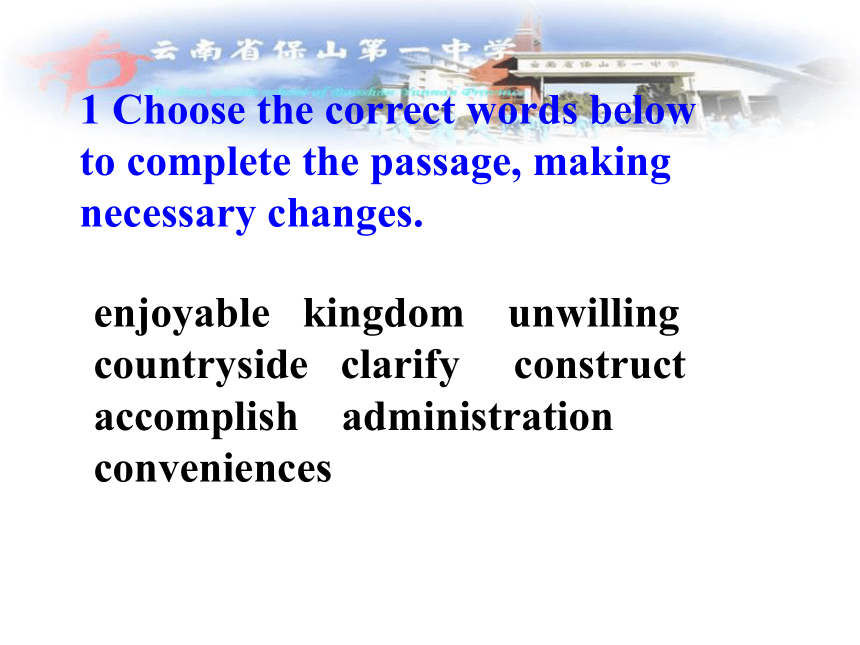

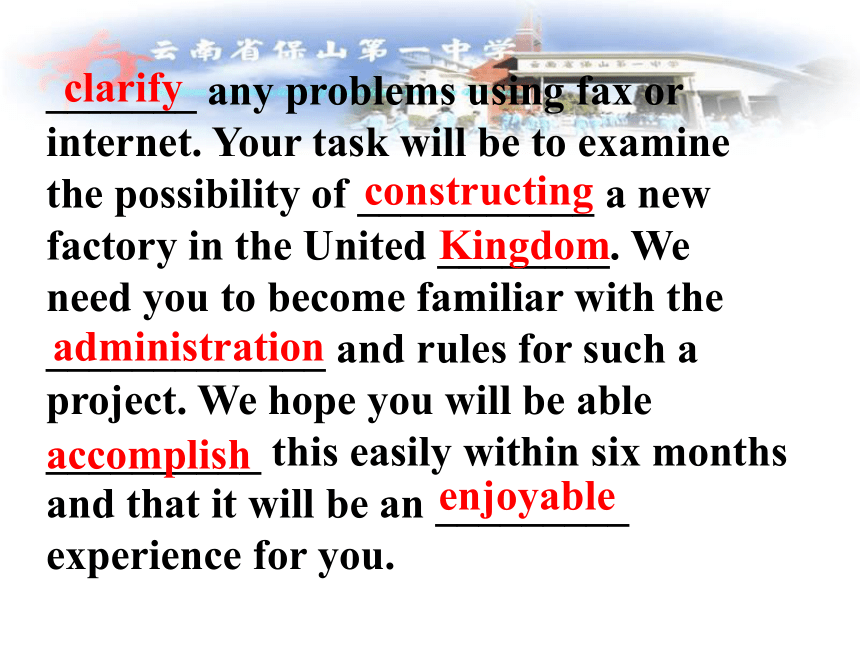
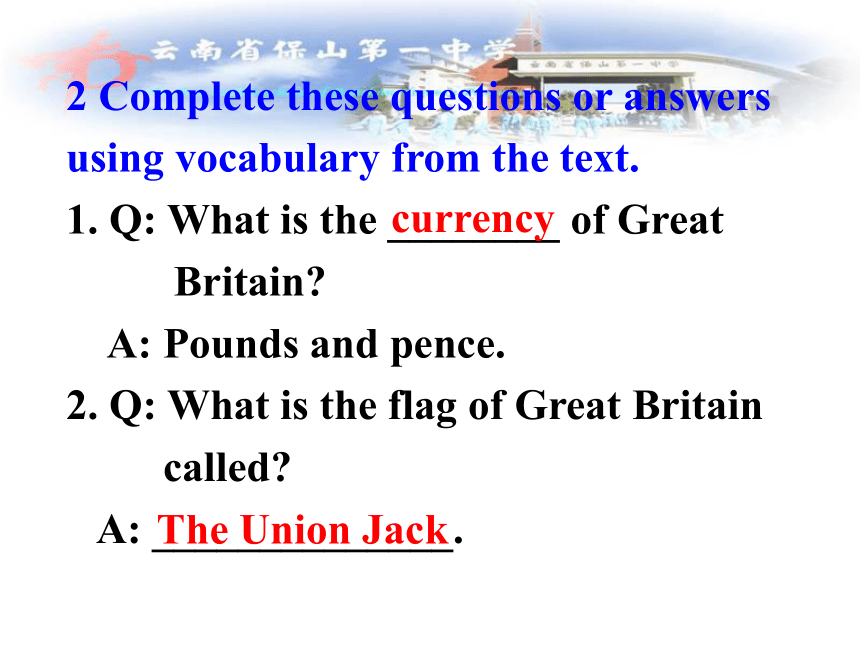
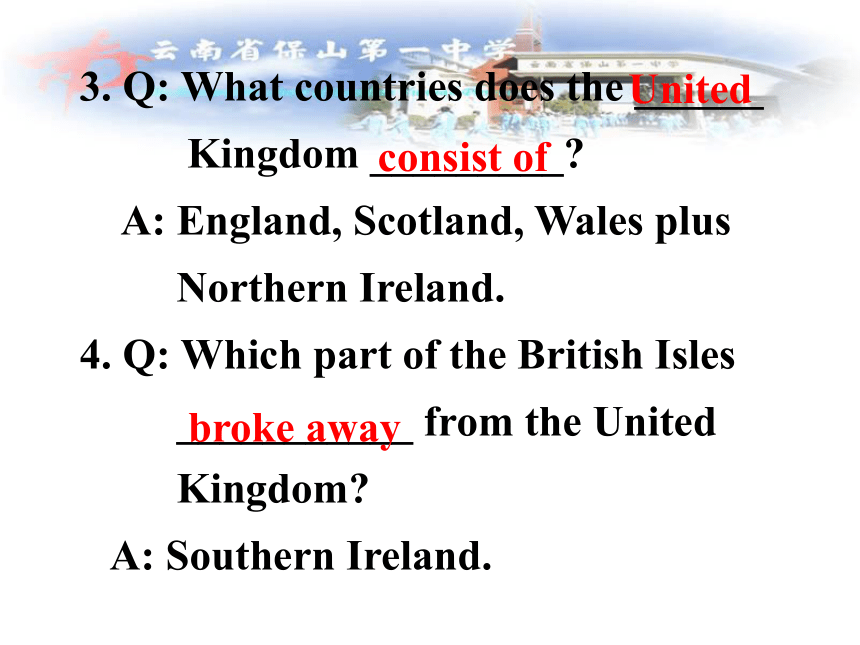
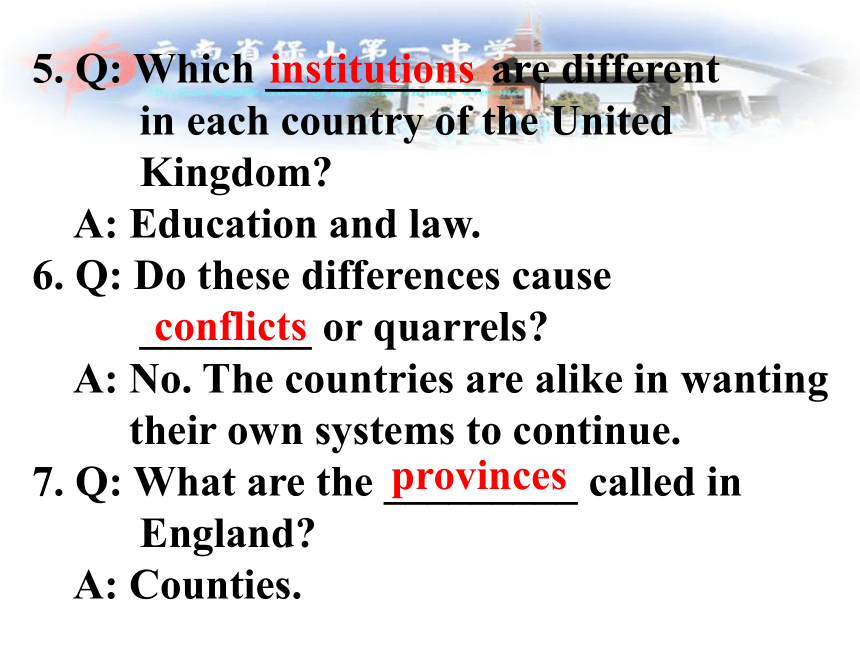
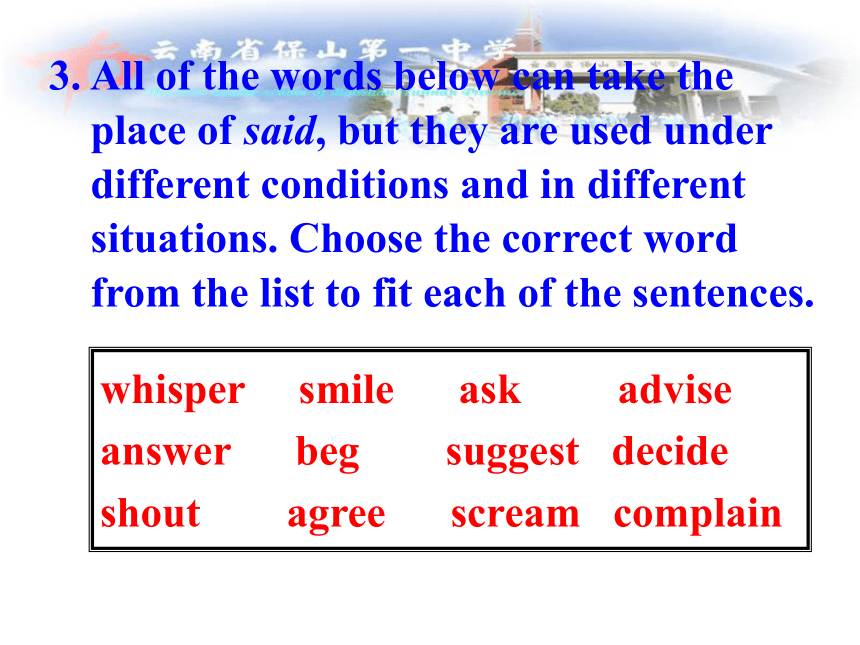
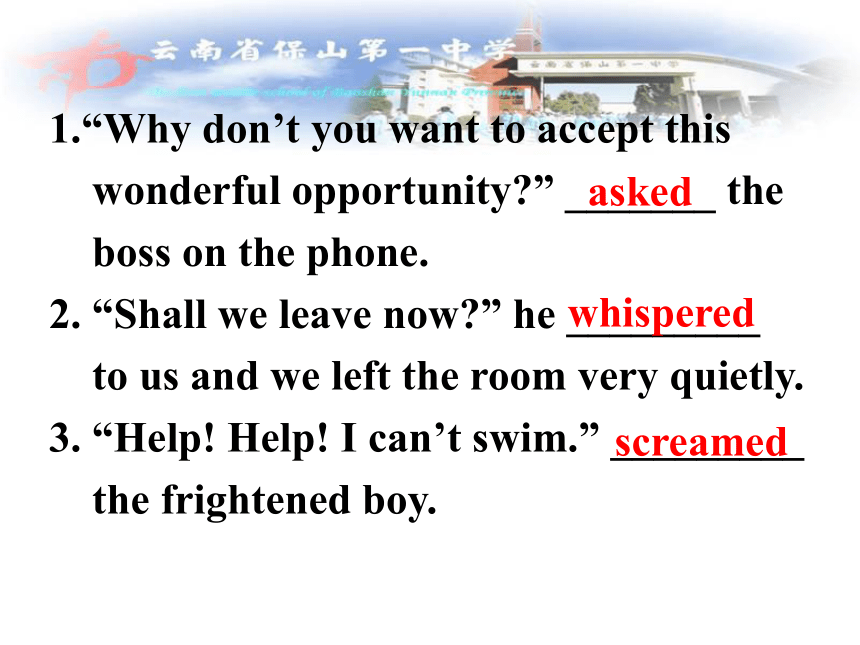
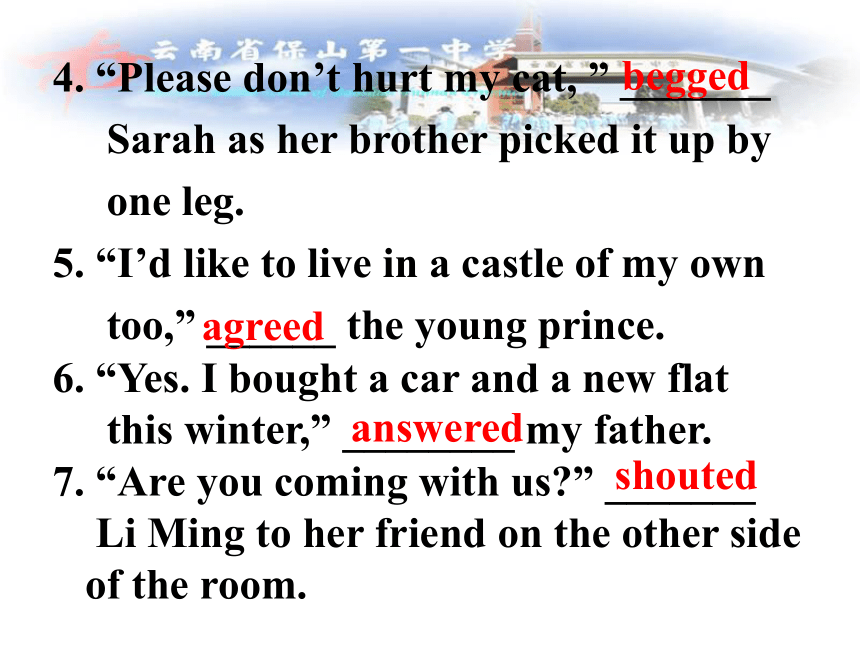
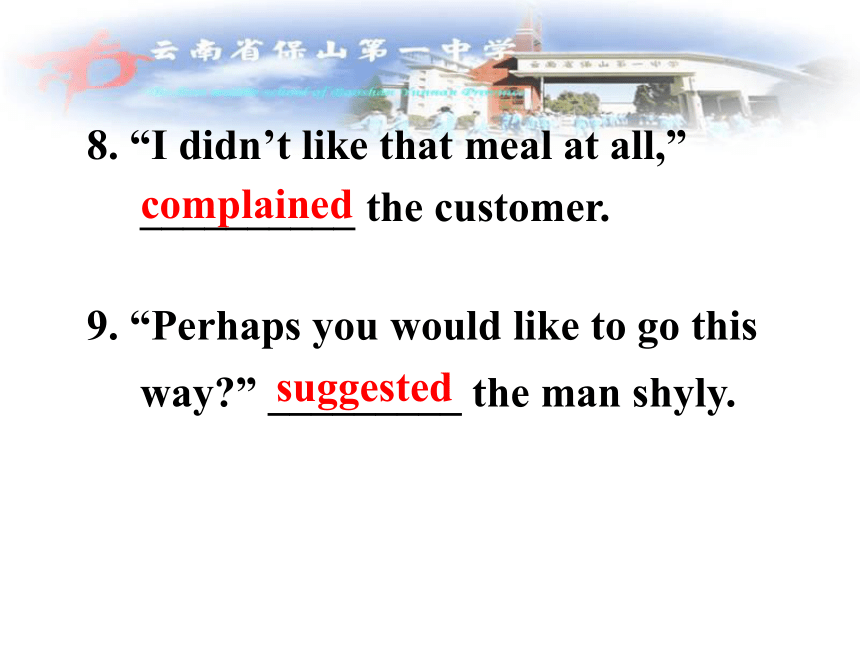
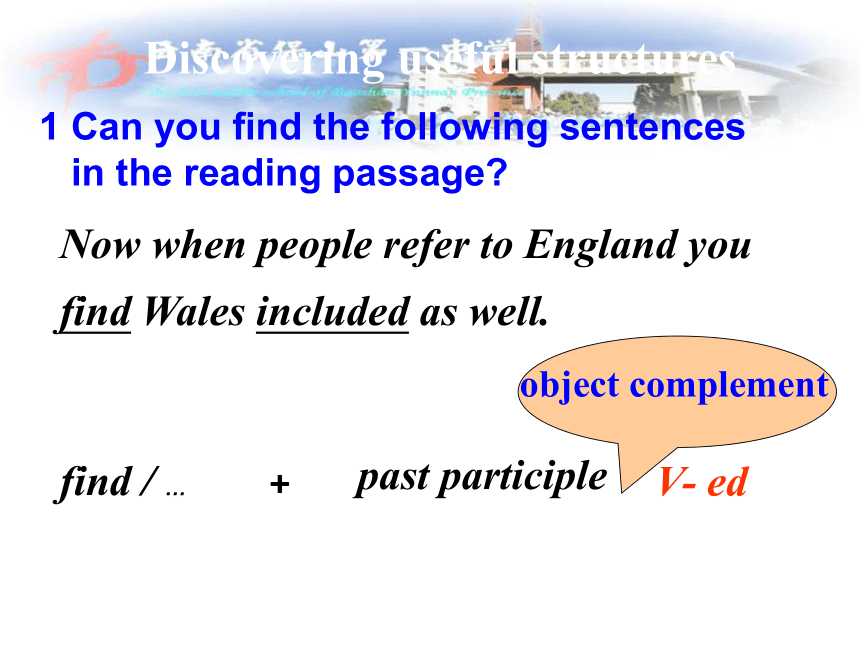
文档简介
课件67张PPT。Unit 2
The United Kingdom
Learning about language1 Choose the correct words below
to complete the passage, making
necessary changes.
enjoyable kingdom unwilling
countryside clarify construct
accomplish administration
conveniences “Why are you ________ to accept this wonderful opportunity?” asked the boss on the phone. “Have you ever read the description carefully? You will live in a town close to the __________ in England in a furnished house with all modern ___________. Our office in Beijing will be able to unwillingcountrysideconveniences_______ any problems using fax or
internet. Your task will be to examine
the possibility of ___________ a new
factory in the United ________. We
need you to become familiar with the
_____________ and rules for such a
project. We hope you will be able
__________ this easily within six months
and that it will be an _________
experience for you.Kingdomconstructingclarifyadministrationenjoyableaccomplish2 Complete these questions or answers
using vocabulary from the text.
1. Q: What is the ________ of Great
Britain?
A: Pounds and pence.
2. Q: What is the flag of Great Britain
called?
A: ______________. currencyThe Union Jack3. Q: What countries does the ______
Kingdom _________?
A: England, Scotland, Wales plus
Northern Ireland.
4. Q: Which part of the British Isles
___________ from the United
Kingdom?
A: Southern Ireland. Unitedconsist ofbroke away5. Q: Which __________ are different
in each country of the United
Kingdom?
A: Education and law.
Q: Do these differences cause
________ or quarrels?
A: No. The countries are alike in wanting
their own systems to continue.
7. Q: What are the _________ called in
England?
A: Counties. institutionsconflictsprovinces3. All of the words below can take the place of said, but they are used under different conditions and in different situations. Choose the correct word from the list to fit each of the sentences.whisper smile ask advise answer beg suggest decide shout agree scream complain1.“Why don’t you want to accept this
wonderful opportunity?” _______ the
boss on the phone.
2. “Shall we leave now?” he _________
to us and we left the room very quietly.
3. “Help! Help! I can’t swim.” _________
the frightened boy.whisperedaskedscreamed4. “Please don’t hurt my cat, ” _______
Sarah as her brother picked it up by
one leg.
5. “I’d like to live in a castle of my own
too,” ______ the young prince.
6. “Yes. I bought a car and a new flat
this winter,” ________ my father.
7. “Are you coming with us?” _______
Li Ming to her friend on the other side
of the room.beggedagreedansweredshouted9. “Perhaps you would like to go this
way?” _________ the man shyly.suggested8. “I didn’t like that meal at all,”
__________ the customer.complained1 Can you find the following sentences
in the reading passage?Now when people refer to England you find Wales included as well.find / …﹢past participleV- edobject complementDiscovering useful structuresThree more sentences in the reading passage. Now, when anyone refers to England you
find Wales included as well.
So to their surprise the three countries
find themselves united…
…they were going to get Ireland
connected to form the United kingdom.Para 2Para 3Para 32 Complete the sentences by using the
words in brackets and the structure
have/get/find something done.1. We _________________________ now.
2. You look different today. _____________
_______________
3. Do you want to _____________________
__________ to your house or would you
prefer to come to the shop for it?have got the house mended Have you hadyour hair cut?have the dictionarydelivered4. A: Could I have a look at the photographs
you took when you were in Europe?
B: Sorry, I _________________________ yet.
5. On my way to the station my car broke
down. When I got to the repair shop I
_________________.
6. The computer doesn’t seem to work.
Well, you’d better _______________.haven’t had the film developed found it closedget it repaired7. Jill and Eric ______________________
while they were on holiday.
8. The listening text might be easier for
the students if you _____________ into
two parts.
9. At yesterday’s meeting Tony
____________________________. have it dividedhad some of his points clarifiedgot all their money stolen10. Chris ___________________ to Sarah
on her birthday. Then Chris asked Sarah
to marry him and they ________________
in the newspaper. They had no time to
arrange their own wedding, so they
__________________________ by a
company.had some flowers sent had it announcedhad the celebration arranged1. take the place of = replace 代替
=take sb’s place 代替某人
Computers have taken the place of typewriters in most offices.
在大多数的办公室里, 电脑已经取代了打字机。take place 发生, 举行
in place of =instead of 代替Language Points 2. arrange v. (for连用) 安排, 筹备, 布置
arrangement n. 筹备, 安排
arrange to do sth. 安排做某事, 预定
arrange for 安排, 准备Fill in the blanks:
1) Please _______ the books on the shelves.
2) I have to ____________ everything.arrangearrange (for)3) They have ___________ another man to take his place.
4) She helped me _______ the flowers.
5) She ________ to meet Tom after work.
6) They made ______________ to share the food.arranged forarrangean arrangementarranged3. fold v.& n. 折叠, 弯曲, 合起来
folder 纸夹
foldaway a. 可折叠的
unfold 打开(反义词)
fold back 折叠起来; 折回去
fold up 失败; 倒闭 The little child folded her hands in prayer. 这个小孩合上双手祈祷。
She folded the handkerchief and put it in her pocket. 她叠好手绢, 放进了口袋里。Past participles used as object complement
(过去分词做宾语补足语)GrammarWe think him clever.
What he said made me angry.
They consider the answer correct.
Everyone calls him Tom.宾语宾补带有宾语补足语的一般句型为: His father named him Daming.
They painted their house white.
You mustn’t force him to lend his
money to you.
4. Nobody noticed him enter the room.
5. We saw her entering the room. (名词)(动词不定式)(现在分词或其短语)(形容词)(动词不定式)5. We must get the work finished by
10 o’clock.
6. We take English as a useful tool
for research work.
7. Whenever you may go, you will
find him at work.
8. Let the fresh air in.
9. The plant has its own name. You
cannot call it what you will. (过去分词)(用as引出)(介词短语)(副词)(从句)作宾语补足语的过去分词与宾语之间的关系 及物动词(短语)的过去分词用作宾语补足
语时, 宾语即是过去分词的逻辑宾语, 宾语
和过去分词之间存在逻辑上的被动关系。
如: I want the letter posted.
我想把这封信寄出去。 2. 少数不及物动词如 go, change, fall 等的
过去分词作宾语补足语时, 仅表示动作完成。
因此, 宾语与过去分词之间不存在逻辑上
的被动关系。如: She found her necklace gone on her
way home. 在回家的路上, 她发现项链不见了。
3. 动词 seat, hide, dress 等的过去分词作
宾语补足语一般表示状语而不表示被动的
意义, 因此, 虽然宾语与它们存在逻辑上
的主动关系, 但也只能用它们的过去分词
作宾语补足语。
如: When I came in, I found a strange girl
seated in the corner.
我进来时, 发现一个陌生的女孩坐在角落里。 使役动词 get, have, make, keep, leave
等后, 可用过去分词做宾语补足语, 表:
“致使某人或某事被……”We should keep them informed of what
is going on here.Jane got her bad tooth pulled out at
the dentist’s.需用过去分词作宾语补足语的情况 I had my recorder repaired. ( I asked somebody else to repair it. )I had the room cleaned.( I organized it. )He had his foot injured.( something bad happened. )TomHe had his hair cut.He had his clothes washed.He had his room cleaned.He had his walls painted.He had his bike repaired.hairclothesroomwallsbikeHe got his leg injured.He got his glasses broken.He got his camera damaged.He got his wallet stolen.2. 感官动词feel, find, hear, notice, see, watch
等表示感觉和心理状态的动词之后,
表: “感受到某人或某事被做”。I was sleeping when I heard
my name called. He was disappointed to find his suggestions turned down.LilyShe found Tom’s hair cut.She found his room cleaned.She found his bike repaired.She found his clothes washed.She found the walls painted.hairclothesroomwallsbikeI saw him ___________________.scoldscolded by his motherI saw ___________________.bitehim bitten by a dogI saw ___________________.robher robbed by a manFill in the blanks.I heard someone _________me.
I heard my name ________. I found Tom _______ the window.
I found the window _______.callingcalledbreakbrokenI had my watch repaired.
I had my room cleaned.
I had my foot injured.She found his hair cut.
She found his clothes washed.
She found his room cleaned. have sth./sb. done find sth./sb doneHe got his leg injured.
He got his camera
damaged.
He got his glasses broken. get sth./sb doneI saw him scolded by his mother.
I saw him bitten by a dog.
I saw her robbed by a man. see sth./sb. doneI made him punished. make sth./sb. doneI watched him killed. watch sth./sb done3. 表示“意欲; 命令”的动词如: like, order,
want, wish, 相当于过去分词短语前省略了to be,
表示“希望/要求某人或某事被做”。I wish these letters (to be) typed as soon as possible.He didn’t want such question discussed at the meeting.The father wants his daughter taught the piano. 看 watch, notice, see, look at, observe catch
听 hear, listen to
感 feel 闻 smell 发现 find情感 want, wish, like使役 keep, leave, get, have, makesth./sb. done+=sth./sb. 被……1) Being poor at English, I’m afraid
I can’t make myself ______.
A. understand
B. to understand
C. understanding
D. understood D 2) I have had my bike ______, and
I’m going to have somebody
______ my radio tomorrow.
A. repair; to repair
B. repairing; to be repaired
C. repaired; repair
D. to repair; repairing C3) You must get the work ______
before Friday.
A. do B. to do
C. doing D. done D 4) ______ the room, the nurse
found the tape-recorder ______ .
A. Entering; stealing
B. Entering; stolen
C. To have entered; being stolen
D. Having entered; to be stolen B 5) We are pleased to see the
problem ______ so quickly.
A. settled
B. having been settled
C. be settled
D. settling settle 解决A 4. 有时过去分词作宾补可以变为被动
语态, 这时过去分词改作主语补足语,
说明主语所处的状态。The door was found broken.Her bag was found stolen when
she woke up.5.“with +宾语+过去分词”结构中, 过去分词
用作介词 with 的宾语补足语。这一结构通常
在句中作时间、方式、条件、原因等状语。 The murderer was brought in, with his hands
tied behind his back. 凶手被带进来了, 他的
双手被绑在背后。(表方式)With water heated, we can see the steam.
水一被加热, 我们就会看到水蒸气。(表条件) With the matter settled, we all went home.
事情得到解决, 我们都回家了。(表原因) 注意:在这一结构中, 当宾语为某一身体部位, 且作
宾补的动词是及物动词时, 身体部位通常是
过去分词的逻辑宾语, 因而过去分词不可换用
现在分词。
She stood in front of him, with her eyes fixed
on his face. 她站在他面前, 眼睛注视着他的脸。
(fix one’s eyes on 为固定短语, 因此, 不可将
句中 fixed 换为 fixing )
He stood for an instant with his hand still
raised. 他仍然举着手站了一会儿。当用某些不及物动词的分词形式作身体部位的宾补时, 用现在分词的形式。 She felt her heart beating fast.
她觉得心跳很快。
(beat 意为“心跳”, 是不及物动词)掌握“使役动词 have + 宾语+过去分词”的几种含义: 在“ have +宾语+过去分词”结构中, 过去分词
作宾语补足语, have 也可用 get 。这一结构
具有以下几种含义:1) 意为“主语请别人做某事”。如:
He wants to have his eyes examined
tomorrow. 他明天想去检查眼睛。
(“检查”的动作由医生来进行)2) 意为“主语遭遇、遭受某一不愉快、不测的
事情”。如:
Be careful, or you’ll have your hands hurt.
当心, 否则会弄伤手的。 3) 意为“使完成某事”, 事情既可以是别人做完,
也可以由主语参与完成。如:
He had the walls painted this morning.
他今早把墙漆了。(主语自己可能参与) 6. 过去分词与不定式, 现在分词作宾补的
区别: 三者与宾语逻辑上都是主谓关系,
但过去分词强调他们之间的被动关系,
不定式强调动作发生的全过程, 现在分词
强调他们之间的主动关系, 正在进行。I saw her come into the classroom.I saw her coming into the classroom.I saw her taken out of the classroom.省略to的情况:1) 情态动词 (除ought 外, ought to);
2) 使役动词 let, have, make;
3) 感官动词 see, watch, look at, notice, observe,
hear, listen to, smell, feel, find 等后作宾补,
省略to。注意: 在被动语态中则to不能省掉。
I saw him dance. =He was seen to dance.
The boss made them work the whole night.
=They were made to work the whole night.Exercise:The managers discussed the plan that
they would like to see ____ the next year.
A. carry out B. carrying out
C. carried out D. to carry out
2. Mrs. Brown was much disappointed
to see the washing machine she had had
_______ went wrong again.
A. it B. it repaired
C. repaired D. to be repairedC C 3. With a lot of difficult problems _____,
the newly—elected president is having
a hard time.
A. settled B. settling
C. to settle D. being settled
4. With trees, flowers and grass _____
everywhere, my native town had taken
a new look.
A. planting B. planted
C. to plant D. to be plantedCB 5. She was glad to see her child well _____
care of.
A. take B. to be taken C. taken D. taking
6. The result of the entrance exams was
not made _____ to the public until last
Thursday.
A. knowing B. known
C. to know D. to be knownC B 7. I can make you _____ what I say, but
you can’t make yourself ____ in English.
A. understand; understand
B. understand, understood
C. to understand, understand
D. understand; to be understoodB 8. He found them ____ at a table_____
A. sat; to play chess
B. sitting; to play chess
C. seated; playing chess
D. seat; play the chess
9. John rushed out in a hurry, _____
the door _____.
A. leaving; unlocked B. leaving; unlocking
C. left, unlocked D. to leave; unlockingC A 10. We are pleased to see the problem
_____ so quickly.
A. settled B. settling
C. be settled D. having been settled
11. I could feel the wind ___ on my face
from an open window.
A. to blow B. blowing
C. to be blowing D. blownA B 12. Helen had to shout _____ above the
music.
A. making herself hear
B. to make herself hear
C. making herself heard
D. to make herself heard.D13. Laws that punish parents for their
little children’s actions against the
laws get parents ______.
A. worried B. to worry
C. worrying D. worry
14. It is wise to have some money
____ for old age.
A. put away B. kept up
C. given away D. laid upAA15. ---I can’t see the words on the blackboard.
---Perhaps you need __________.
A. to have your eyes examined
B. to examine your eye
C. to have examined your eyes
D. your eyes to be examined
16. They woke up, finding everything
around ________.
A. changing B. change
C. changed D. to changeA CFor more exercises, click here.Homework1. Preview “Sightseeing in London”.
2. Learn the new words by heart.Thank You!
The United Kingdom
Learning about language1 Choose the correct words below
to complete the passage, making
necessary changes.
enjoyable kingdom unwilling
countryside clarify construct
accomplish administration
conveniences “Why are you ________ to accept this wonderful opportunity?” asked the boss on the phone. “Have you ever read the description carefully? You will live in a town close to the __________ in England in a furnished house with all modern ___________. Our office in Beijing will be able to unwillingcountrysideconveniences_______ any problems using fax or
internet. Your task will be to examine
the possibility of ___________ a new
factory in the United ________. We
need you to become familiar with the
_____________ and rules for such a
project. We hope you will be able
__________ this easily within six months
and that it will be an _________
experience for you.Kingdomconstructingclarifyadministrationenjoyableaccomplish2 Complete these questions or answers
using vocabulary from the text.
1. Q: What is the ________ of Great
Britain?
A: Pounds and pence.
2. Q: What is the flag of Great Britain
called?
A: ______________. currencyThe Union Jack3. Q: What countries does the ______
Kingdom _________?
A: England, Scotland, Wales plus
Northern Ireland.
4. Q: Which part of the British Isles
___________ from the United
Kingdom?
A: Southern Ireland. Unitedconsist ofbroke away5. Q: Which __________ are different
in each country of the United
Kingdom?
A: Education and law.
Q: Do these differences cause
________ or quarrels?
A: No. The countries are alike in wanting
their own systems to continue.
7. Q: What are the _________ called in
England?
A: Counties. institutionsconflictsprovinces3. All of the words below can take the place of said, but they are used under different conditions and in different situations. Choose the correct word from the list to fit each of the sentences.whisper smile ask advise answer beg suggest decide shout agree scream complain1.“Why don’t you want to accept this
wonderful opportunity?” _______ the
boss on the phone.
2. “Shall we leave now?” he _________
to us and we left the room very quietly.
3. “Help! Help! I can’t swim.” _________
the frightened boy.whisperedaskedscreamed4. “Please don’t hurt my cat, ” _______
Sarah as her brother picked it up by
one leg.
5. “I’d like to live in a castle of my own
too,” ______ the young prince.
6. “Yes. I bought a car and a new flat
this winter,” ________ my father.
7. “Are you coming with us?” _______
Li Ming to her friend on the other side
of the room.beggedagreedansweredshouted9. “Perhaps you would like to go this
way?” _________ the man shyly.suggested8. “I didn’t like that meal at all,”
__________ the customer.complained1 Can you find the following sentences
in the reading passage?Now when people refer to England you find Wales included as well.find / …﹢past participleV- edobject complementDiscovering useful structuresThree more sentences in the reading passage. Now, when anyone refers to England you
find Wales included as well.
So to their surprise the three countries
find themselves united…
…they were going to get Ireland
connected to form the United kingdom.Para 2Para 3Para 32 Complete the sentences by using the
words in brackets and the structure
have/get/find something done.1. We _________________________ now.
2. You look different today. _____________
_______________
3. Do you want to _____________________
__________ to your house or would you
prefer to come to the shop for it?have got the house mended Have you hadyour hair cut?have the dictionarydelivered4. A: Could I have a look at the photographs
you took when you were in Europe?
B: Sorry, I _________________________ yet.
5. On my way to the station my car broke
down. When I got to the repair shop I
_________________.
6. The computer doesn’t seem to work.
Well, you’d better _______________.haven’t had the film developed found it closedget it repaired7. Jill and Eric ______________________
while they were on holiday.
8. The listening text might be easier for
the students if you _____________ into
two parts.
9. At yesterday’s meeting Tony
____________________________. have it dividedhad some of his points clarifiedgot all their money stolen10. Chris ___________________ to Sarah
on her birthday. Then Chris asked Sarah
to marry him and they ________________
in the newspaper. They had no time to
arrange their own wedding, so they
__________________________ by a
company.had some flowers sent had it announcedhad the celebration arranged1. take the place of = replace 代替
=take sb’s place 代替某人
Computers have taken the place of typewriters in most offices.
在大多数的办公室里, 电脑已经取代了打字机。take place 发生, 举行
in place of =instead of 代替Language Points 2. arrange v. (for连用) 安排, 筹备, 布置
arrangement n. 筹备, 安排
arrange to do sth. 安排做某事, 预定
arrange for 安排, 准备Fill in the blanks:
1) Please _______ the books on the shelves.
2) I have to ____________ everything.arrangearrange (for)3) They have ___________ another man to take his place.
4) She helped me _______ the flowers.
5) She ________ to meet Tom after work.
6) They made ______________ to share the food.arranged forarrangean arrangementarranged3. fold v.& n. 折叠, 弯曲, 合起来
folder 纸夹
foldaway a. 可折叠的
unfold 打开(反义词)
fold back 折叠起来; 折回去
fold up 失败; 倒闭 The little child folded her hands in prayer. 这个小孩合上双手祈祷。
She folded the handkerchief and put it in her pocket. 她叠好手绢, 放进了口袋里。Past participles used as object complement
(过去分词做宾语补足语)GrammarWe think him clever.
What he said made me angry.
They consider the answer correct.
Everyone calls him Tom.宾语宾补带有宾语补足语的一般句型为: His father named him Daming.
They painted their house white.
You mustn’t force him to lend his
money to you.
4. Nobody noticed him enter the room.
5. We saw her entering the room. (名词)(动词不定式)(现在分词或其短语)(形容词)(动词不定式)5. We must get the work finished by
10 o’clock.
6. We take English as a useful tool
for research work.
7. Whenever you may go, you will
find him at work.
8. Let the fresh air in.
9. The plant has its own name. You
cannot call it what you will. (过去分词)(用as引出)(介词短语)(副词)(从句)作宾语补足语的过去分词与宾语之间的关系 及物动词(短语)的过去分词用作宾语补足
语时, 宾语即是过去分词的逻辑宾语, 宾语
和过去分词之间存在逻辑上的被动关系。
如: I want the letter posted.
我想把这封信寄出去。 2. 少数不及物动词如 go, change, fall 等的
过去分词作宾语补足语时, 仅表示动作完成。
因此, 宾语与过去分词之间不存在逻辑上
的被动关系。如: She found her necklace gone on her
way home. 在回家的路上, 她发现项链不见了。
3. 动词 seat, hide, dress 等的过去分词作
宾语补足语一般表示状语而不表示被动的
意义, 因此, 虽然宾语与它们存在逻辑上
的主动关系, 但也只能用它们的过去分词
作宾语补足语。
如: When I came in, I found a strange girl
seated in the corner.
我进来时, 发现一个陌生的女孩坐在角落里。 使役动词 get, have, make, keep, leave
等后, 可用过去分词做宾语补足语, 表:
“致使某人或某事被……”We should keep them informed of what
is going on here.Jane got her bad tooth pulled out at
the dentist’s.需用过去分词作宾语补足语的情况 I had my recorder repaired. ( I asked somebody else to repair it. )I had the room cleaned.( I organized it. )He had his foot injured.( something bad happened. )TomHe had his hair cut.He had his clothes washed.He had his room cleaned.He had his walls painted.He had his bike repaired.hairclothesroomwallsbikeHe got his leg injured.He got his glasses broken.He got his camera damaged.He got his wallet stolen.2. 感官动词feel, find, hear, notice, see, watch
等表示感觉和心理状态的动词之后,
表: “感受到某人或某事被做”。I was sleeping when I heard
my name called. He was disappointed to find his suggestions turned down.LilyShe found Tom’s hair cut.She found his room cleaned.She found his bike repaired.She found his clothes washed.She found the walls painted.hairclothesroomwallsbikeI saw him ___________________.scoldscolded by his motherI saw ___________________.bitehim bitten by a dogI saw ___________________.robher robbed by a manFill in the blanks.I heard someone _________me.
I heard my name ________. I found Tom _______ the window.
I found the window _______.callingcalledbreakbrokenI had my watch repaired.
I had my room cleaned.
I had my foot injured.She found his hair cut.
She found his clothes washed.
She found his room cleaned. have sth./sb. done find sth./sb doneHe got his leg injured.
He got his camera
damaged.
He got his glasses broken. get sth./sb doneI saw him scolded by his mother.
I saw him bitten by a dog.
I saw her robbed by a man. see sth./sb. doneI made him punished. make sth./sb. doneI watched him killed. watch sth./sb done3. 表示“意欲; 命令”的动词如: like, order,
want, wish, 相当于过去分词短语前省略了to be,
表示“希望/要求某人或某事被做”。I wish these letters (to be) typed as soon as possible.He didn’t want such question discussed at the meeting.The father wants his daughter taught the piano. 看 watch, notice, see, look at, observe catch
听 hear, listen to
感 feel 闻 smell 发现 find情感 want, wish, like使役 keep, leave, get, have, makesth./sb. done+=sth./sb. 被……1) Being poor at English, I’m afraid
I can’t make myself ______.
A. understand
B. to understand
C. understanding
D. understood D 2) I have had my bike ______, and
I’m going to have somebody
______ my radio tomorrow.
A. repair; to repair
B. repairing; to be repaired
C. repaired; repair
D. to repair; repairing C3) You must get the work ______
before Friday.
A. do B. to do
C. doing D. done D 4) ______ the room, the nurse
found the tape-recorder ______ .
A. Entering; stealing
B. Entering; stolen
C. To have entered; being stolen
D. Having entered; to be stolen B 5) We are pleased to see the
problem ______ so quickly.
A. settled
B. having been settled
C. be settled
D. settling settle 解决A 4. 有时过去分词作宾补可以变为被动
语态, 这时过去分词改作主语补足语,
说明主语所处的状态。The door was found broken.Her bag was found stolen when
she woke up.5.“with +宾语+过去分词”结构中, 过去分词
用作介词 with 的宾语补足语。这一结构通常
在句中作时间、方式、条件、原因等状语。 The murderer was brought in, with his hands
tied behind his back. 凶手被带进来了, 他的
双手被绑在背后。(表方式)With water heated, we can see the steam.
水一被加热, 我们就会看到水蒸气。(表条件) With the matter settled, we all went home.
事情得到解决, 我们都回家了。(表原因) 注意:在这一结构中, 当宾语为某一身体部位, 且作
宾补的动词是及物动词时, 身体部位通常是
过去分词的逻辑宾语, 因而过去分词不可换用
现在分词。
She stood in front of him, with her eyes fixed
on his face. 她站在他面前, 眼睛注视着他的脸。
(fix one’s eyes on 为固定短语, 因此, 不可将
句中 fixed 换为 fixing )
He stood for an instant with his hand still
raised. 他仍然举着手站了一会儿。当用某些不及物动词的分词形式作身体部位的宾补时, 用现在分词的形式。 She felt her heart beating fast.
她觉得心跳很快。
(beat 意为“心跳”, 是不及物动词)掌握“使役动词 have + 宾语+过去分词”的几种含义: 在“ have +宾语+过去分词”结构中, 过去分词
作宾语补足语, have 也可用 get 。这一结构
具有以下几种含义:1) 意为“主语请别人做某事”。如:
He wants to have his eyes examined
tomorrow. 他明天想去检查眼睛。
(“检查”的动作由医生来进行)2) 意为“主语遭遇、遭受某一不愉快、不测的
事情”。如:
Be careful, or you’ll have your hands hurt.
当心, 否则会弄伤手的。 3) 意为“使完成某事”, 事情既可以是别人做完,
也可以由主语参与完成。如:
He had the walls painted this morning.
他今早把墙漆了。(主语自己可能参与) 6. 过去分词与不定式, 现在分词作宾补的
区别: 三者与宾语逻辑上都是主谓关系,
但过去分词强调他们之间的被动关系,
不定式强调动作发生的全过程, 现在分词
强调他们之间的主动关系, 正在进行。I saw her come into the classroom.I saw her coming into the classroom.I saw her taken out of the classroom.省略to的情况:1) 情态动词 (除ought 外, ought to);
2) 使役动词 let, have, make;
3) 感官动词 see, watch, look at, notice, observe,
hear, listen to, smell, feel, find 等后作宾补,
省略to。注意: 在被动语态中则to不能省掉。
I saw him dance. =He was seen to dance.
The boss made them work the whole night.
=They were made to work the whole night.Exercise:The managers discussed the plan that
they would like to see ____ the next year.
A. carry out B. carrying out
C. carried out D. to carry out
2. Mrs. Brown was much disappointed
to see the washing machine she had had
_______ went wrong again.
A. it B. it repaired
C. repaired D. to be repairedC C 3. With a lot of difficult problems _____,
the newly—elected president is having
a hard time.
A. settled B. settling
C. to settle D. being settled
4. With trees, flowers and grass _____
everywhere, my native town had taken
a new look.
A. planting B. planted
C. to plant D. to be plantedCB 5. She was glad to see her child well _____
care of.
A. take B. to be taken C. taken D. taking
6. The result of the entrance exams was
not made _____ to the public until last
Thursday.
A. knowing B. known
C. to know D. to be knownC B 7. I can make you _____ what I say, but
you can’t make yourself ____ in English.
A. understand; understand
B. understand, understood
C. to understand, understand
D. understand; to be understoodB 8. He found them ____ at a table_____
A. sat; to play chess
B. sitting; to play chess
C. seated; playing chess
D. seat; play the chess
9. John rushed out in a hurry, _____
the door _____.
A. leaving; unlocked B. leaving; unlocking
C. left, unlocked D. to leave; unlockingC A 10. We are pleased to see the problem
_____ so quickly.
A. settled B. settling
C. be settled D. having been settled
11. I could feel the wind ___ on my face
from an open window.
A. to blow B. blowing
C. to be blowing D. blownA B 12. Helen had to shout _____ above the
music.
A. making herself hear
B. to make herself hear
C. making herself heard
D. to make herself heard.D13. Laws that punish parents for their
little children’s actions against the
laws get parents ______.
A. worried B. to worry
C. worrying D. worry
14. It is wise to have some money
____ for old age.
A. put away B. kept up
C. given away D. laid upAA15. ---I can’t see the words on the blackboard.
---Perhaps you need __________.
A. to have your eyes examined
B. to examine your eye
C. to have examined your eyes
D. your eyes to be examined
16. They woke up, finding everything
around ________.
A. changing B. change
C. changed D. to changeA CFor more exercises, click here.Homework1. Preview “Sightseeing in London”.
2. Learn the new words by heart.Thank You!
